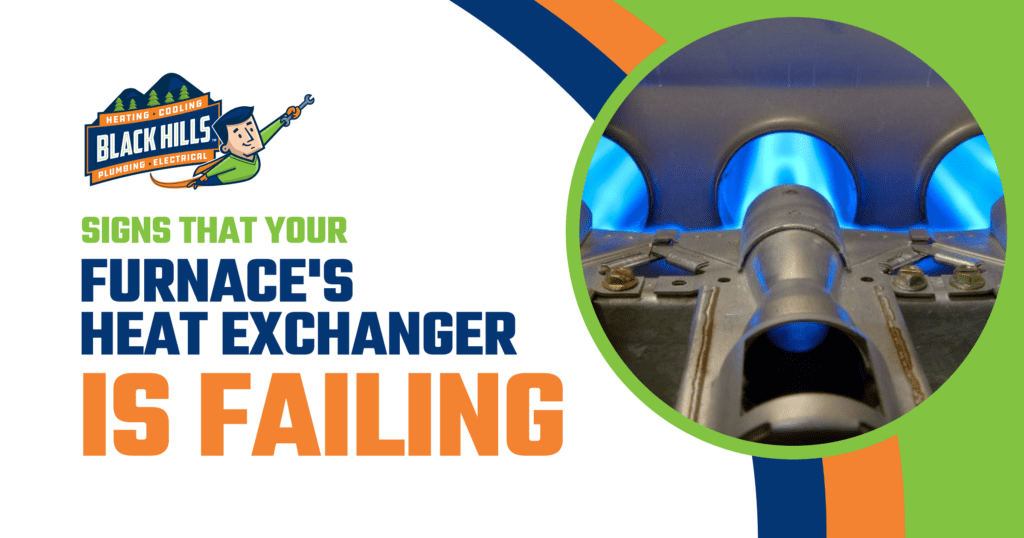The heat exchanger is one of the key components of a gas furnace. It extracts heat from the sealed combustion chamber to warm the air pushed through it. Heat is then delivered to your home through the air ducts.
Heat exchangers keep your home’s clean air separate from the toxic air used in combustion and exchange heat between them. A failing or cracked heat exchanger can cause toxic gases–such as carbon monoxide, sulfur dioxide, and nitrogen dioxide–to be released and mixed into the air that is distributed to your home.
It is critical that you know the signs of a cracked heater exchanger so you know when to call for repairs.
6 Signs of a Bad Heat Exchanger
Heat exchanger failure is hard to spot from a quick visual inspection because it is enclosed in a metal chamber. Luckily, there are a few symptoms of a bad heat exchanger you can look out for.
Call a furnace repair technician if you notice any of the following signs of a cracked heat exchanger:
- The Burner Flame Is Yellow or Orange
The flame should always be blue. Blue means everything is working fine. If you see a flickering yellow flame, there’s a problem with the combustion process, and oxygen may be getting into the chamber. A dirty burner can be the reason, but a cracked heat exchanger is also possible.
- The Furnace Is Producing Soot
A crack can cause soot to build up on the exchanger. The soot originates from the combustion chamber; it may collect at the site of the crack or inside the furnace because the gas isn’t burning completely. As a result, carbon buildup forms. Soot may also collect in or around the furnace’s burners. A soot-clogged heat exchanger means the combustion isn’t as efficient as it should be.
- Strong Odors Occur Around the Furnace
An unpleasant smell, possibly similar to formaldehyde, is a sure sign of a problem. Your heating system should not emit strong odors. You might notice a slight burning smell when starting up the unit for the season. This should not last long, but if it does or the odor is strong and unpleasant, call for heater repairs.
- You Hear the Carbon Monoxide Alarm
While other combustion gases have a noticeable odor, carbon monoxide (CO) doesn’t. It also has no color or taste, yet is deadly and flammable in high concentrations. If your CO detector goes off, leave your home and call for help. Schedule annual furnace inspections to find and fix issues early.
- Your Furnace Makes Unusual Noises
You may be asking yourself, “How can I tell if my heat exchanger is cracked?” A cracked heat exchanger can cause a rattling, popping, or banging noise. Throughout the heating process, cracked metal will expand and contract. This creates audible cues that something is wrong. The problem will only get worse if ignored.
- Visible Signs of Damage
Corrosion, stress cracks, and other signs of wear on the furnace should be checked by a professional. If there isn’t a condensation issue, water on the floor can mean the heat exchanger is bad. Other potential causes of pooling water include a leaking humidifier or clogged HVAC drain.
Why Did My Heat Exchanger Fail?
Heat exchangers can fail due to overheating, extreme dust accumulation (which can overheat the system), and frequent alternation between heating and cooling. Constant expansion and contraction will cause the heat exchanger to wear out.
Rust, corrosion, and the furnace’s age can also play a role in the exchanger cracking or otherwise failing. Furnaces over 15 years of age are at a higher risk of developing a cracked heat exchanger, which reduces efficiency and creates many hazards.
Contact an HVAC Professional If Your Heat Exchanger Is Failing
If you notice any of the signs of a bad heat exchanger above or otherwise suspect a problem with your furnace, don’t try to fix it yourself. Turn off your heating system and call an HVAC contractor to inspect it. A damaged exchanger must be replaced. But if your furnace is over 15 years old, the technician will likely suggest replacing the entire unit.
Homeowners in Olympia, Washington, can rely on Black Hills for furnace maintenance and repair. We also replace older systems with more efficient models. Available 24/7, we can respond to any heating emergency. Our technicians are licensed, bonded, and trained to address heat exchanger problems and other issues quickly. To request service, contact us online or call 888-743-1041 today.
